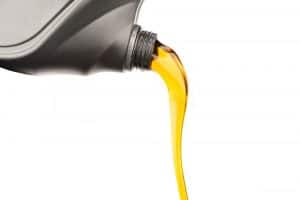If you want to maintain a good condition in your car, you must ensure adequate lubrication first. By using the proper type of lubricants, maintaining regular oil changes, you can improve the overall performance of your car.
However, oils are not all the same. There are different types of oils. For instance, gear oil, engine oil, MTF, ATF, etc.
Now, let us know a comprehensive difference between gear oil and engine oil. And, as you are here to know whether you can use engine oil as gear oil or not, we have come out with the right answer for you.
So, just keep reading the article until the end.
Basic Differences Between Engine Oil & Gear Oil
Gear Oil
Gear oil is specially formulated to be used on gears. It is a liquid lubricant that helps the units of gearboxes function smoothly. The lubricant offers high viscosity and comes with organosulfur compounds.
There are a lot of metal-on-metal frictions that happened inside the gearbox. It causes a lot of heat and wear-and-tear. Besides, gear oil helps protect these moving parts by reducing friction inside the gearbox and thus the gear parts generate less heat and corrosion.
So, if your gearbox does not have enough lubricants to run smoothly, then it’ll affect your car’s performance, and eventually cause costly repairs.
Where gear oil comes to play:
- Transmission
- Differentials
- Manual gearboxes
- Transaxles
- Transfer cases
These units run smoothly through the use of gear oil. Plus, the lubricant works to protect many internal units of your gear systems from wear and heat damage. A good quality gear oil can also reduce the noise that comes from gearboxes.
Another important thing we should let you know about gear oil is, it needs to be mixed with additives to save the inner units of the gearbox. These are:
- Rust and corrosion inhibitors
- Oxidation inhibitors
- Antifoam agents
- Pour-point depressants
- Pressure and anti-wear agents
Engine Oil
Along with the gear oil, your engine needs engine oil as well. Normally, the engine oil lubricates other units in the car engine such as fuel pumps, bearings, as well as some other moving components of it.
Engine oil or motor oil is designed to lubricate the inner components of internal combustion engines. More importantly, it protects the internal units against corrosion and keeps them cool while in use.
It’s made up of two main elements:
- Base stock
- Additives
In general, the base stock makes up 95% of the solution and is either made from petroleum, synthetic chemicals or made of both. The base stock works in lubricating the engine’s moving units and reducing built-up heat.
On the other hand, additives account for around 5% of the oil. This portion is responsible for oil viscosity and lubricity control. Plus, the additives protect engine parts against wear as well.
Again, the motor oil uses different types of additives to protect the inner units of the engine. For example:
- Zinc dialkyl dithiophosphate(ZDDP)
- Magnesium sulphonates
Additives are used so that the engine wear is reduced. Plus, it can also earn a better fuel economy. Here, zinc dialkyl dithiophosphate(ZDDP) is a frequently used additive for preventing wear, while magnesium sulphonates help the oil to break down impurities and engine sludge
Where engine oil comes to play:
- Fuel pumps
- Bearings
- Other moving parts of the engine
Routine Maintenance of the Oils
Whether it is gear oil or motor oil, routine maintenance is the key to keep your engine in good condition. As you know, countless systems and elements rely on lubricants. And the main role of the oils is to lubricate the engine parts properly as they can run smoothly.
So, it’s important to perform regular oil changes. If you want to learn more about oil changes, read the below article.
How Important Is It To Change The Oil In Your Car
Aren’t sure when your car needs an oil change? Then this article is for you.
How does your car act when it needs an oil change | Tell-tail signs
Substitutes for Gear Oil
You wanted to know whether you can use gear oil as engine oil. Now, we are going to show you some fruitful substitutes for gear oil.
Indeed, the gear oil does four main functions:
- Flushes away rusts and contaminants
- Lubricates moving units
- Keeps internals cool
- Protection from corrosion.
When you are not being able to use gear oil, then there are few substitutes for you like manual transmission fluid (MTF) and automatic transmission fluid (ATF). There are differences between manual transmission fluid and automatic transmission fluid. Note that you have to use them under the proper conditions.
Manual Transmission Fluid (MTF)
The manual transmission fluid lubricates the transmission and helps to keep it cool. If your vehicle has become more difficult to shift or is grinding going into gear you should check the manual transmission fluid to make sure that it’s in good shape and at the proper level.
You can use different types of fluids in manual transmissions. For example, automatic transmission fluid, heavyweight hypoid gear oil, or regular motor oil. Good manual transmission fluid must serve several roles, including Enable smooth shifts, fight wear, and protect brass synchronizers.
Let’s now know some major purposes of automatic transmission fluid:
- Limiting the internal temperature
- Protecting the car from overheating.
- Well lubrication
- Avoiding wear and tear of the gears.
Automatic Transmission Fluid (ATF)
Automatic transmission fluid (ATF) is completely different from transmission fluid made for manual transmissions. Since its launch in the 1940s, ATF has been playing an important role in cars.
In the US, most passenger cars use an automatic transmission. It means that the transmission changes gears automatically as needed and you don’t need to take any action to change it.
Again, manual transmissions are dependent on the operation of the clutch and shifter by the driver each time a gear shift is required. Transmissions need particular fluids for ensuring better performance depending on the vehicle make, model, and year.
Automatic transmission fluid lubricates the moving parts as well as provides hydraulic pressure and friction to make the internal parts work. Let’s know some major purposes of automatic transmission fluid:
- Act as a hydraulic fluid
- Deliver the correct frictional requirements
- Protect gear from wear
- Fight the heat
- Gear lubrication
Now, it’s high time we should answer your question. Here it is.
Can I Use Engine Oil as Gear Oil?
The answer is No, most gearboxes need a particular lubricant for running their transmission system. Gear oil and engine oil are not the equivalent things, and they are not interchangeable. Gear oil is specially formulated to be used on gears and engine oil is for use on the engine.
Still, there are exceptions. You can use engine oil as gear oil in few two-wheeled motors. Plus, some agricultural machines also allow both engine and gear oil.
To use in the gearboxes, an oil of SAE 80 or SAE 90 standard is needed. (These oils are thicker than engine oil). Apart from this, if a thicker lubricant is used for gearbox application then it might increase the resistance to the motion of gears in the gearbox.
Note: As with the engine oil, check whether the gear oil suits the manufacturer’s requirements or not.
Conclusion
Different types of fluids are used in a car. No matter what type of fluids are there, it’s always important to perform regular maintenance to keep your car in good condition.
Every lubricant possesses some physical and chemical properties to suit the application in which it is used. If it is used in applications for that it is not meant, then it may hamper the performance of the system.
The gears are lubricated using splash lubrication and the theory says that for best results, one gear must be always dipped in the lubricant. The heat dissipation characteristics and the anti-carbonizing properties of a gearbox lubricant are not that spectacular. So, you should not use gear oil as motor oil.

